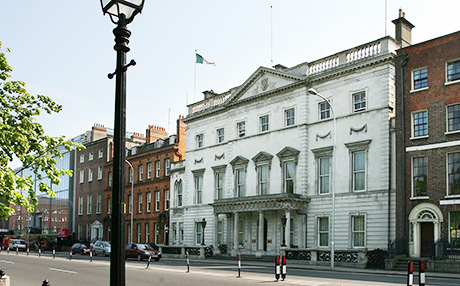Minister Flanagan & MoS McHugh announce €14 million in humanitarian funding to the UN CERF
14/12/16
Minister Flanagan and MoS McHugh today announced the allocation of €14 million in humanitarian funding to the UN Central Emergency Response Fund (CERF)
The Minister for Foreign Affairs and Trade, Charlie Flanagan T.D. and Minister of State for the Diaspora and International Development, Joe McHugh T.D. today announced the allocation of €14 million in humanitarian funding to the UN Central Emergency Response Fund (CERF).
Announcing the funding, Minister Flanagan stated:
“I am announcing an increased contribution of €13 million to the UN Central Emergency Response Fund (CERF) for its activities in 2017; and a top up to our contribution for 2016 of €1 million, bringing our contribution this year to €12.75 million. This critical funding will help some of the world’s most vulnerable people suffering as a result of natural disasters or armed conflicts.
“In 2016, CERF has allocated funding to the world’s largest and most severe crises, including to Syria, Yemen, Iraq and South Sudan. It provides a lifeline to forgotten and under-funded crises such as those in the Central African Republic, DRC, Burundi and Libya. It is vitally important that Ireland continues to be supportive of this work.
“The number of people affected by crises keeps growing; in 2017 92.8 million people will require some form of humanitarian assistance and a staggering $22.2 billion is required to fund global humanitarian response. Crises have become more protracted and the average length of displacement is now 20 years. It therefore behoves all countries to play a part in addressing this monumental challenge”.
Minister of State McHugh added:
“Having attended the World Humanitarian Summit earlier in 2016, I have seen how 2016 has been a year for renewed commitments and return to a focus on our shared humanity. The CERF is a vital tool for humanitarian response and embodies many of the aspirations for collective action which were reinforced by the international community at the Summit.
“Most importantly, the CERF works to ensure that no one is left behind. When I visited Adjumani in northern Uganda earlier this year I met with South Sudanese women and children displaced as a result of the brutal civil war. In 2016 alone, the CERF has provided €28 million to Uganda to support the refugee response, ensuring access to lifesaving health, food and sanitation services. Reflecting the generosity and compassion of the Irish people, Ireland has this year decided to increase its annual contribution to help those affected or displaced by crises."
ENDS
Press Office
13 December 2016
Notes for Editors
• The CERF is a critical UN-managed humanitarian funding mechanism which enables UN humanitarian agencies to swiftly allocate prepositioned funds to sudden crises in order to kick start emergency responses. It also enables the UN to focus on underfunded protracted emergencies, filling vital gaps in humanitarian operations. Ireland is currently the eighth largest donor to the CERF.
• The CERF was set up in 2005 as part of the reform of the international humanitarian system following the Indian Ocean tsunami in 2004. The challenges encountered in responding to the Indian Ocean tsunami demonstrated starkly the need for flexible and rapid emergency funding to be available for sudden-onset emergencies and for neglected and forgotten crises.
• The CERF has a new funding target of $1 billion per annum, which was proposed at the World Humanitarian Summit in Istanbul in May 2016 and agreed by the UN General Assembly. This is an increase from the original target of $450 million.
• Ireland has been a consistent contributor to the CERF, and is currently the 8th largest donor since its inception. Since 2005, Ireland has provided just over $165 million.
• In 2015, Ireland provided €11.75 million to the CERF for its activities in 2016, and top up of €1 million in December has increased this contribution to €12.75.
• In 2016, Ireland is ranked as the eighth largest contributor, after the UK, the Netherlands, Sweden, Norway, Canada, Germany and Denmark.


